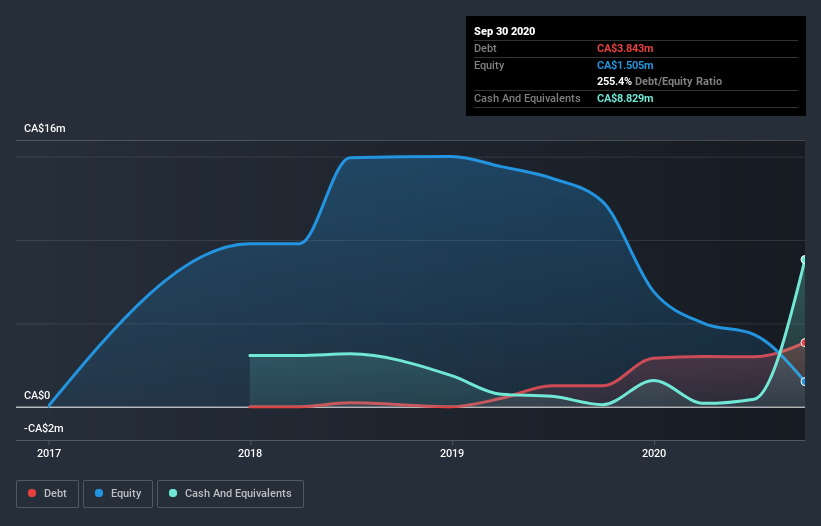
Legendary fund manager Li Lu (who Charlie Munger backed) once said, 'The biggest investment risk is not the volatility of prices, but whether you will suffer a permanent loss of capital.' When we think about how risky a company is, we always like to look at its use of debt, since debt overload can lead to ruin. We can see that Biome Grow Inc. (CSE:BIO) does use debt in its business. But should shareholders be worried about its use of debt?
Why Does Debt Bring Risk?
Debt is a tool to help businesses grow, but if a business is incapable of paying off its lenders, then it exists at their mercy. In the worst case scenario, a company can go bankrupt if it cannot pay its creditors. While that is not too common, we often do see indebted companies permanently diluting shareholders because lenders force them to raise capital at a distressed price. Of course, the upside of debt is that it often represents cheap capital, especially when it replaces dilution in a company with the ability to reinvest at high rates of return. When we think about a company's use of debt, we first look at cash and debt together.
View our latest analysis for Biome Grow
What Is Biome Grow's Debt?
The image below, which you can click on for greater detail, shows that at September 2020 Biome Grow had debt of CA$3.80m, up from CA$1.25m in one year. But it also has CA$8.83m in cash to offset that, meaning it has CA$5.03m net cash.

How Strong Is Biome Grow's Balance Sheet?
The latest balance sheet data shows that Biome Grow had liabilities of CA$5.71m due within a year, and liabilities of CA$2.59m falling due after that. On the other hand, it had cash of CA$8.83m and CA$494.7k worth of receivables due within a year. So it can boast CA$1.02m more liquid assets than total liabilities.
This surplus suggests that Biome Grow has a conservative balance sheet, and could probably eliminate its debt without much difficulty. Succinctly put, Biome Grow boasts net cash, so it's fair to say it does not have a heavy debt load! There's no doubt that we learn most about debt from the balance sheet. But it is Biome Grow's earnings that will influence how the balance sheet holds up in the future. So if you're keen to discover more about its earnings, it might be worth checking out this graph of its long term earnings trend.
In the last year Biome Grow managed to produce its first revenue as a listed company, but given the lack of profit, shareholders will no doubt be hoping to see some strong increases.
So How Risky Is Biome Grow?
We have no doubt that loss making companies are, in general, riskier than profitable ones. And in the last year Biome Grow had an earnings before interest and tax (EBIT) loss, truth be told. Indeed, in that time it burnt through CA$1.2m of cash and made a loss of CA$12m. Given it only has net cash of CA$5.03m, the company may need to raise more capital if it doesn't reach break-even soon. Importantly, Biome Grow's revenue growth is hot to trot. High growth pre-profit companies may well be risky, but they can also offer great rewards. The balance sheet is clearly the area to focus on when you are analysing debt. However, not all investment risk resides within the balance sheet - far from it. Be aware that Biome Grow is showing 4 warning signs in our investment analysis , and 2 of those are potentially serious...
Of course, if you're the type of investor who prefers buying stocks without the burden of debt, then don't hesitate to discover our exclusive list of net cash growth stocks, today.
When trading Biome Grow or any other investment, use the platform considered by many to be the Professional's Gateway to the Worlds Market, Interactive Brokers. You get the lowest-cost* trading on stocks, options, futures, forex, bonds and funds worldwide from a single integrated account. Promoted
Valuation is complex, but we're here to simplify it.
Discover if Biome Grow might be undervalued or overvalued with our detailed analysis, featuring fair value estimates, potential risks, dividends, insider trades, and its financial condition.
Access Free AnalysisThis article by Simply Wall St is general in nature. It does not constitute a recommendation to buy or sell any stock, and does not take account of your objectives, or your financial situation. We aim to bring you long-term focused analysis driven by fundamental data. Note that our analysis may not factor in the latest price-sensitive company announcements or qualitative material. Simply Wall St has no position in any stocks mentioned.
*Interactive Brokers Rated Lowest Cost Broker by StockBrokers.com Annual Online Review 2020
Have feedback on this article? Concerned about the content? Get in touch with us directly. Alternatively, email editorial-team (at) simplywallst.com.
About CNSX:BIO
Moderate with weak fundamentals.
Market Insights
Community Narratives




